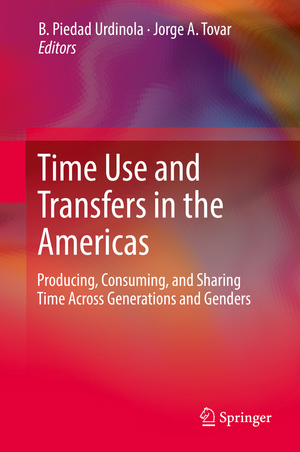Time Use and Transfers in the Americas: Producing, Consuming, and Sharing Time Across Generations and Genders
Editat de B. Piedad Urdinola, Jorge A. Tovaren Limba Engleză Hardback – 4 apr 2019
Preț: 638.43 lei
Preț vechi: 751.10 lei
-15% Nou
Puncte Express: 958
Preț estimativ în valută:
122.16€ • 127.89$ • 101.08£
122.16€ • 127.89$ • 101.08£
Carte disponibilă
Livrare economică 15-29 martie
Preluare comenzi: 021 569.72.76
Specificații
ISBN-13: 9783030118051
ISBN-10: 3030118053
Pagini: 190
Ilustrații: VII, 144 p. 57 illus., 25 illus. in color.
Dimensiuni: 155 x 235 x 15 mm
Greutate: 0.36 kg
Ediția:1st ed. 2019
Editura: Springer International Publishing
Colecția Springer
Locul publicării:Cham, Switzerland
ISBN-10: 3030118053
Pagini: 190
Ilustrații: VII, 144 p. 57 illus., 25 illus. in color.
Dimensiuni: 155 x 235 x 15 mm
Greutate: 0.36 kg
Ediția:1st ed. 2019
Editura: Springer International Publishing
Colecția Springer
Locul publicării:Cham, Switzerland
Cuprins
Introduction.- Chapter 1. Time Use Differences and Similarities between Developed and Emerging Economies in the Americas: Gretchen Donehower, B.Piedad Urdinola, Jorge A. Tovar.- Chapter 2. Home and Market Production Time Use Differentials in Colombia: B. Piedad Urdinola, Jorge A. Tovar.- Chapter 3. Time Use Patterns by Educational Level in Costa Rica: Pamela Jimémez-Fontana.- Chapter 4. Gender Differences in Home Production in Uruguay: Cecilia Lara, Cecilia González, Marisa Bucheli.- Chapter 5. Gender and Work for US Residents of Latin American and Caribbean Ancestry: Gretchen Donehouwer.- Conclusions and final observations: B. Piedad Urdinola, Jorge A. Tovar.
Notă biografică
B. Piedad Urdinola is an Associate Professor in the Department of Statistics of the National University of Colombia-Bogotá. She holds a Ph.D. in Demography at the University of Berkeley. Recipient of the Tinker Visiting Professor at Stanford University (2011) and Visiting Professor Santo Domingo at the University of Harvard (2015). Its research agenda covers issues of demography, of conflict, underreporting of mortality, mortality projections, aging and time use, and adolescent fertility. She co-directs and manages the Latin American Human Mortality Database and directs the chapter for Colombia of the international project National Transfers Accounts.
Jorge Tovar is currently associate professor at the economics department, Universidad de Los Andes, Bogota - Colombia. He holds a BA and MA degree in economics from Universidad de Los Andes and a Ph.D. in Economics from U.C. Berkeley. He has been a visiting scholar at the Centre for Latin American Studies at Stanford. His research fields focus on International Trade, Industrial Organization and he has particular interest in the economics of households as well as sports economics. He has published chapters and books on the topic and a number of papers in journals such as World Development, Science, The Review of Industrial Organization or The Developing Economies.
Jorge Tovar is currently associate professor at the economics department, Universidad de Los Andes, Bogota - Colombia. He holds a BA and MA degree in economics from Universidad de Los Andes and a Ph.D. in Economics from U.C. Berkeley. He has been a visiting scholar at the Centre for Latin American Studies at Stanford. His research fields focus on International Trade, Industrial Organization and he has particular interest in the economics of households as well as sports economics. He has published chapters and books on the topic and a number of papers in journals such as World Development, Science, The Review of Industrial Organization or The Developing Economies.
Textul de pe ultima copertă
This book provides a comparison of the measurement in time and monetary units of unpaid domestic work in Colombia, Costa Rica, Uruguay, and the Hispanic ethnicity in the United States. A standardized technique allows the development of comparable estimates across countries per age and gender which reveal specific behavioral patterns over the life cycle. A mixture of economic conditions, social norms, and demographic trends provide insightful explanations for the unequal burden that women and girls carry when dealing with unpaid domestic activities, an economically significant but traditionally neglected activity. As such, the book is of interested to practitioners in all social sciences, particularly sociologists, demographers, economists, and policymakers.
Caracteristici
Delivers gender and age profiles of time use on market work and domestic unpaid work with both monetary and time measurements Makes a comparison between developed and developing nations in the Americas Present a cross country comparison, with a common methodology that can contrast developed and developing nations
